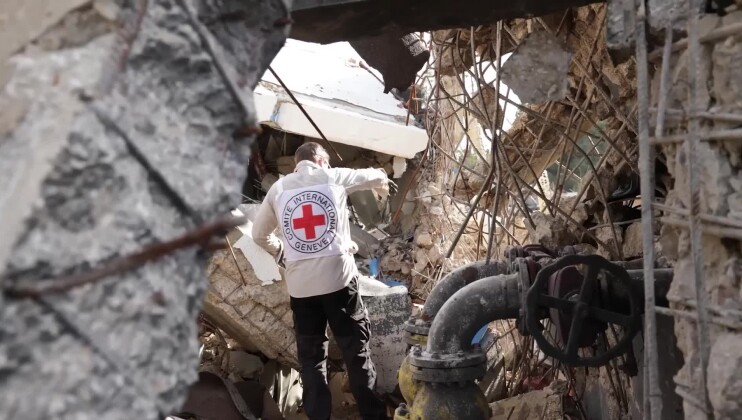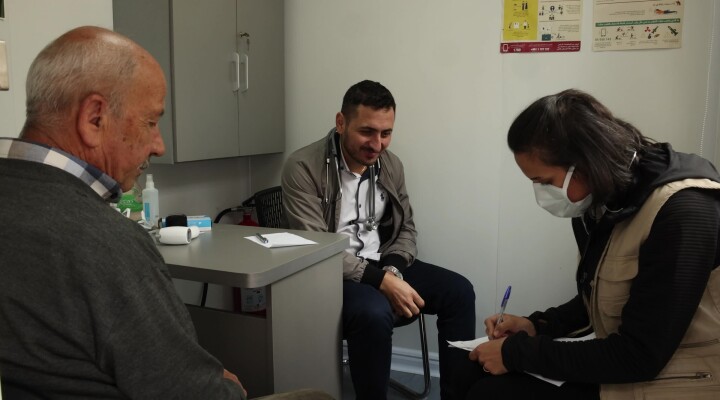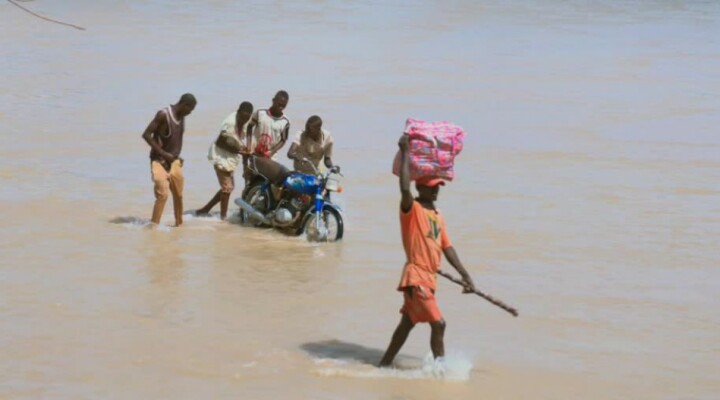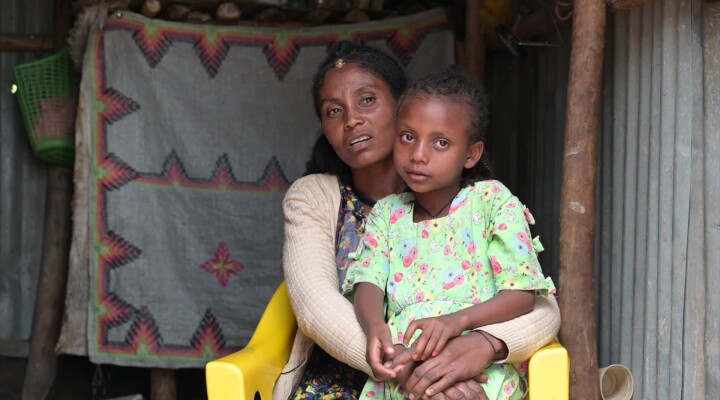South Sudan: Thousands of families fleeing Sudan conflict struggle to access vital services
Thousands of families forced to flee the conflict in Sudan have taken refuge in Boro Medina, a town of some 5,000 inhabitants in the Western Bahr el Ghazal State of South Sudan. Most of them arrive in dire conditions, a major concern in an area where most resources and services are already limited.
"We are expecting many people to arrive in the coming days. There is no livelihood in Sudan and people are fearing for their lives. That is why everyone is coming to Boro," said Abakar Musa Abakar, who escaped the town of Nyala in the Southern Darfur region of Sudan.
The influx of people into Boro Medina and other border areas has increased the pressure on fragile resources and services such as food, water, and health care. Road insecurity and the upcoming rain season will further complexify the situation in the weeks to come.
Marina, a mother of six, fled South Sudan years ago when the conflict was raging there. A few weeks ago, she had to travel back, caught up in a new conflict, this time in Sudan. « When we left Sudan, we left our belongings there. We left everything behind, there was no way we could carry them on the head. When we arrived here, the houses we left were not there anymore. The situation was difficult for us and there was no food. We had no money to buy soap, no money to buy some sorghum to eat with the children. The issue of food has been solved for now, thanks to the Red Cross, we have been given food.”
Since the conflict in Sudan started almost a year ago, the International Committee of the Red Cross (ICRC) together with the South Sudanese Red Cross Society has distributed food, seeds and tools to more than 45,000 people who have fled to South Sudan, and to the communities hosting them, often in remote, hard-to-reach areas. It has also helped improve access to clean water for thousands by repairing water facilities. This emergency assistance will support families as they seek new sources of income trying to rebuild their lives.
For further information please contact:
Fatima Sator, ICRC Geneva, Tel: +41 79 848 49 08, fsator@icrc.org
Follow the ICRC on facebook.com/icrc and twitter.com/icrc
Notes for editors:
LOGLIST
|
On-screen credit |
ICRC |
|
Shooting date |
14/03/2024 |
|
Country/Location |
South Sudan, Boro Medina |
|
Language |
Arabic / Juba Arabic |
|
Producer |
Mark Kamau |
|
Cameraperson |
Mark Kamau, Junior Ali |
|
Copyright / Details of restriction if applicable |
ICRC |
|
TIME CODE |
LOCATION / IMAGE / TIMECODED TRANSCRIPT OF SOUNDBITES |
|
00:00 - 00:00:14 |
Shots of people arriving in Boro Medina from Sudan. Some are disembarking from a bus. |
|
00:14 -:00:20 |
Medium shot of people drawing water from a well. Marina and her daughter Sabrina (3 years) waiting for their turn. |
|
00:20-00:29 |
Shots of Marina and her daughter carrying water on their way back home. |
|
|
Soundbite: Marina Samuel Hajjarah, South Sudanese woman forced to return to her place of origin. |
|
00:29-00:33 |
When we fled to Sudan, |
|
00:34-:00:37 |
before the conflict at home, we were fine, it’s not a lie. |
|
00:37- 00:00:40 |
Our main livelihood was agriculture |
|
00:40- 00:43 |
and my husband used to work at a telecom company. |
|
00:44- 00:46 |
Now, since the conflict |
|
00:47-00:48 |
in 2022, |
|
00:49- 00:51 |
there was no more food. |
|
00:52- 00:55 |
We had to take an axe and go to the bush |
|
00:56- 00:57 |
to cut wood |
|
00:57- 00:59 |
So we could eat. |
|
01:00- 01:02 |
There were thugs who would not let you be. |
|
01:03-01:06, |
They would rape women in the bush. |
|
01:07- 01:12 |
They would stop women with their horses. |
|
01:12- 01:15 |
They would stop you and rape you in the bush. |
|
01:15- 01:17 |
We just lived in fear. |
|
01:17- 01:23 |
Since we went to Sudan, three people were killed that way. |
|
01:23-:01:26 |
And they raped six women. |
|
01:26- 01:28 |
They were caught in the bush. |
|
01:29-01:30 |
So we were afraid. |
|
01:30- 01:33 |
We were in Sudan for seven years. |
|
01:33- 01:37 |
When we left Sudan, we left our belongings behind. |
|
01:38- 01:44 |
There's nothing for us to sleep on except an old mat, |
|
01:45-:01:46 |
only a mat, because there is no bed. |
|
01:47- 01:53 |
We left everything behind, there was no way we could carry them on our heads. |
|
01:53- 02:08 |
Shots of Marina's destroyed house in Boro Medina
|
|
|
Soundbite: Marina Samuel Hajjarah, South Sudanese woman forced to return to her place of origin. |
|
02:08- 02:10 |
When we arrived here, the houses we left here were gone. |
|
02:11-02:12 |
There was just one house left. |
|
02:14,-02:18 |
It is the house that we lived in long ago, before we left South Sudan. |
|
02:18- 02:21 |
There is just a wall left. We came and found just a wall. |
|
02:21- 02:35 |
Shots of Marina's homestead |
|
|
Soundbite: Marina Samuel Hajjarah, South Sudanese woman forced to return to her place of origin. |
|
02:33-02:36 |
Now thank God, when we arrived in Boro, |
|
02:37- 02:39 |
the situation was difficult for us, and there was no food and |
|
02:39-02:43 |
no money to buy sorghum for the children to eat, |
|
02:44-02:49 |
until now with the arrival of the Red Cross, they have helped us so much. |
|
|
Soundbite Abakar Musa Abakar, Refugee from Nyala, Sudan. Chief of Refugee Camp in Boro Medina. |
|
02:49-02:54 |
We are expecting many people to arrive in the coming days. |
|
02:55- 02:57 |
There is no livelihood in Sudan and people fear for their lives. |
|
02:59-03:02 |
If you have some valuable items, people will shoot you in the night, and take them, |
|
03:02-:03:04 |
but you will not know who killed you. |
|
03:04-03:05 |
You will not know. |
|
03:05-03:08 |
That is why people there live in fear, there is no survival mechanism, |
|
03:08-03:09 |
that is why everyone comes to Boro. |
|
03:09-03:58 |
Shots of a convoy of ICRC trucks going through different terrains on the way to Boro Medina from Wau. |
|
03:58-04:05 |
General shots of car and people in Boro Medina. |
|
04:05-04:25 |
Aerial shot of ICRC trucks arriving in Boro Medina |
|
04:25- 05:04 |
Shots of people collecting food assistance from the ICRC. |
|
05:04-05:35 |
Shots of Marko Sherifadin Adam and two of his sons. South Sudan Returnee. He is Marina's husband. He is pushing a bicycle carrying sacks of food from an ICRC distribution in Boro Medina. |
|
|
Soundbite Abakar Musa Abakar, Refugee from Nyala, Sudan. Chief of Refugee Camp in Boro Medina. |
|
05:35-05:40 |
You know, it’s Ramadan and a lot of people don’t have food, but they brought it for us. |
|
05:41-05:42 |
We are grateful. |
|
05:42-5:47 |
We now have flour, we have sugar, all brought to us. |
|
05:47- 05:53 |
We have beans. |
|
05:53-05:55 |
It is already being prepared, and we will eat from it. |
|
05:55- 05:58 |
The Red Cross is the only organization that has helped us with food. |
|
05:58- 06:03 |
All this time we have been asking for food, but no one has supported us. |
|
06:03- 06:11 |
Only the Red Cross gave us food. |
|
06:11- 06:23 |
Shots of Marina and daughter Sabrina arriving home with water. |
|
06:23-06:43 |
Exterior shots of food preparation at Marina's homestead. |
|
06:43- 07:21 |
Exterior shots of Marina's family sharing a meal. |
|
07:21-07:44 |
Shots of Marko Sherifadin Adam working with friends making wooden items. |
|
07:44-07:48 |
Shot of Marko Sherifadin Adam's wooden containers in shop in Boro Medina. |
|
|
ENDS |



